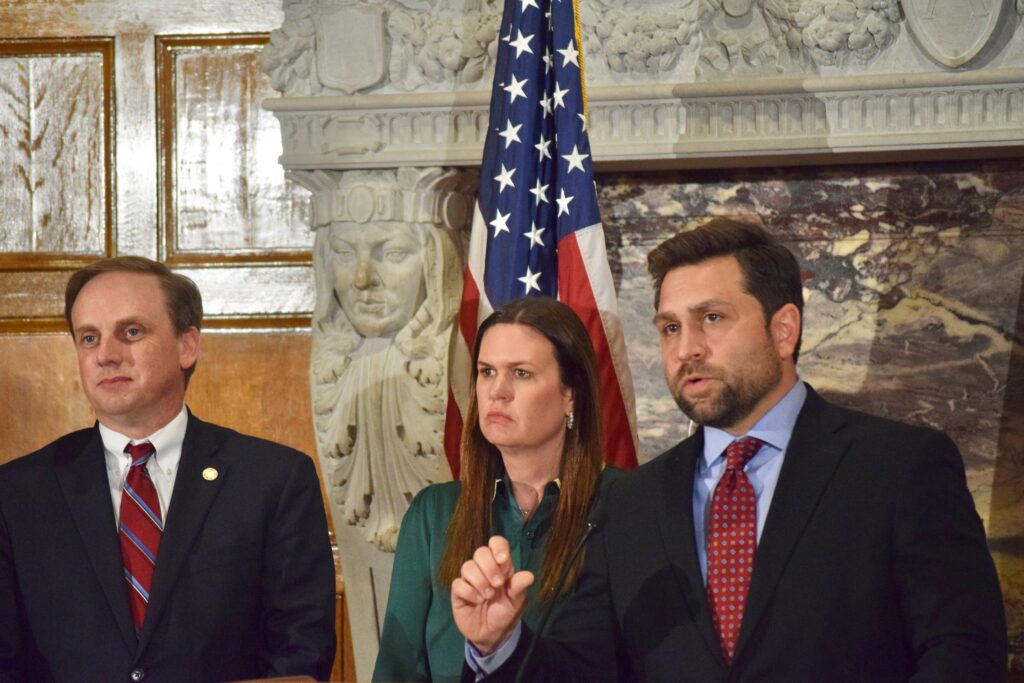
by Hunter Field, Arkansas Advocate
The Arkansas Legislature on Monday gaveled into an extraordinary session at the call of Gov. Sarah Huckabee Sanders.
The Senate Committee on Revenue and Taxation quickly passed an income tax cut package through Senate Bill 8 by Sen. Jonathan Dismang, R-Searcy.
In all, the proposed cuts would cost $248.5 million in state revenue this fiscal year, which ends June 30, 2024.
What does the tax cut proposal actually do?
The stated primary purpose of the special session this week is to cut income taxes.
SB 8 proposes doing so in three ways:
- Cutting the top individual income tax rate from 4.7% to 4.4%.
- Cutting the top corporate income tax rate from 5.1% to 4.8%.
- Creating a one-time tax credit for $150 for those earning up to about $90,000 this year.
What would change with individual income taxes?
The three-percentage-point income tax cut for Arkansans paying the highest rate would take effect next year if enacted this week.
Arkansans who earn more than $24,300 annually — about 1.1 million taxpayers — would see some sort of reduction in tax liability, with the reduction increasing for taxpayers who earn more.

The change is projected to cost the state about $75 million in revenue in fiscal 2024 and $150 million in fiscal 2025.
What would happen with corporate income taxes?
SB 8, if enacted, would also reduce the top corporate income tax rate by three percentage points beginning next year.
It would affect about 7,500 businesses in Arkansas with net annual revenues greater than $11,000.

The corporate tax break will cost the state $17.2 million in fiscal 2024 and $34.5 million in fiscal 2025.
What is this one-time tax credit?
SB8 would also create a nonrefundable tax credit for the ongoing tax year.
The full $150 credit would be available for taxpayers who earn up to $89,600 this year. It will be phased out for individuals up to $103,600 in annual income.
For example, an individual earning $100,000 this year would be eligible for a $40 credit.
Married couples filing jointly can claim a $300 credit up to $179,200. The credit phases out for couples earning up to $207,200.
Part-year resident and nonresident filers are not eligible for the credit, and it will be effective only for tax year 2023.
What is this reserve account?
The Legislature is also considering Senate Bill 1 by Sen. Jimmy Hickey, R-Texarkana.
The legislation proposes the creation of a new reserve account for the $710 million that remains unallocated from Arkansas’ $1.16 billion revenue surplus in fiscal 2023, which ended June 30.
Hickey described the fund as an insurance policy to protect the state against an economic downturn or unforeseen future costs, but he emphasized that the one-time surplus funds weren’t being used to cut taxes.
Does anyone oppose these tax proposals?
Several community and advocacy groups have spoken against SB 8, arguing that any tax relief should be targeted more toward lower-income earners or that excess state revenue could be redirected to improving critical services.
Officials from the Arkansas Rural Community Alliance asked lawmakers to oppose the tax cuts because the money would be better spent on summer and after-school programs.
Laura Kellams, the Northwest Arkansas director for Arkansas Advocates for Children and Families, said there are plenty of programs, services and infrastructure where the revenues being used to cut taxes could go.
She pointed to decaying bridges, critical needs of children in the state, mental health funding and addressing Arkansas’ nation-leading maternal mortality rate.
What do supporters of the tax cuts say?
Dismang, the Senate sponsor, has pointed to a number of previous tax cuts enacted by the Legislature that focused on lower-income tax brackets.
Others have noted that Arkansas’ string of record surpluses indicate that the state is collecting too much money in taxes.
Dismang said Monday these types of cuts will attract job creators to the state that will improve the economic climate for everyone.
Sanders and other Republicans also hope to eventually eliminate state income taxes to put Arkansas on level footing when it comes to economic development with Texas and Tennessee, both of which have no state income tax.




